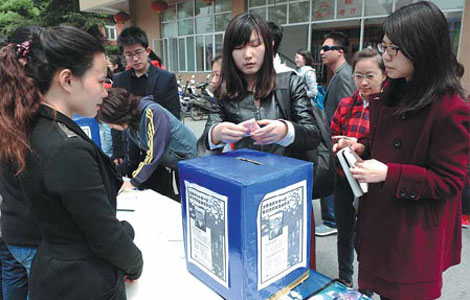Pesticide detectors not always accurate
Updated: 2013-05-07 01:14
(China Daily)
|
|||||||||||
Pesticide residue detectors used in wholesale vegetable markets are not reliable with ginger and other spicy produce, said a Weifang, Shandong province, official.
Since CCTV reported illegal sales and the use of Aldicarb, a highly toxic pesticide, in Weifang, many consumers are now paying great attention to the quality of ginger.
The Weifang government has cracked down on illegal Aldicarb sales and use, but concerns remain.
Aldicarb, one of the most toxic pesticides permitted in China, may be used with only five plants, which exclude ginger, and under stringent restrictions from the Ministry of Agriculture.
CCTV reported that farmers in Weifang are using three to six times as much of the pesticide as is permitted in a given area for ginger, even though they are aware of its toxicity.
"We use a rapid detection instrument made by Beijing Rayleigh Analytical Instrument Co to scan all ginger before it can be sold on our market. We find excessive pesticide residue only once or twice a year," said Wang Jiancheng, a residue detection employee at Anqiu Ginger and Garlic Wholesale Market, Weifang's biggest ginger wholesale market.
The instruction book of Wang's detection instruments does not list ginger among the 136 vegetables and fruits that the devices can be used for.
"We use the same kind of detecting instruments in the vegetable wholesale markets around China. For spicy produce like ginger, garlic and leek, the detector's reading may not be correct," said Yang Chunqiang, deputy director of Anqiu Agriculture Bureau.
"The sharp ingredient in them can affect the detection results," he added.
An employee of a pesticide residue detection company in Qingdao, Shandong, who asked that he and his company remain anonymous, said that rapid detection instruments were effective only with several kinds of pesticide.
Related Stories
Weifang govt to crack down on illegal sale of overused pesticide 2013-05-06 08:09
Crackdown on illegal sale of overused pesticide 2013-05-06 07:14
Pesticide standards 'reasonable', expert says 2012-05-02 10:11
Pesticide standards unlikely to change soon 2012-05-02 07:46
Today's Top News
Detention of petitioners denounced
Lawyers get an advocate
Pentagon accusation on China's military rejected
Foster homes for homeless children
Public hearing to discuss taxi fare increase
21 Party officials, SOE managers disciplined
Clarity on tax evasion needed, lawmakers told
Visa policy to attract global tourists
Hot Topics
Lunar probe , China growth forecasts, Emission rules get tougher, China seen through 'colored lens', International board,
Editor's Picks

|

|

|

|

|

|





